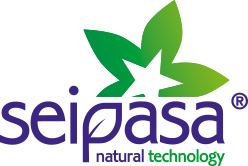Every February 11th since 2016 the General Assembly of the United Nations celebrates the International Day of Women and Girls in Science, a day that is dedicated to calling for gender equality in access and participation in this branch of life and knowledge.
To mark this special day, Seipasa is posting a series of interviews in which we will hear the testimonies and find out the motivations and figures of reference that have inspired the women in our team to pursue careers in science and research. This two-part article features the stories of 8 women who, in their different disciplines, decided to enter the world of science and highlights their talent, efforts and work.
Marta Muñoz is currently finalising an industrial PhD in science and agricultural technologies along with research into natural compounds. Her job at Seipasa is that of product development specialist.
 1. Why did you decide to take up a career in research?
1. Why did you decide to take up a career in research?
Well, mainly because of my passion for agriculture, as it is something I love, and because of my desire to know more and to improve. Also, one of the things that I find most encouraging on a day-to-day basis is the change in agricultural management and production towards a more efficient, more sustainable agriculture, and for this to continue we need research. In short, this coincides 100% with my ideals and principles and is what my current job is all about.
2. What contributions do you hope your research work will make to science?
I hope that it will contribute by providing new tools for pest, disease and weed management. It would be great if these control strategies were to be integrated into agro-ecosystems and contribute to producing better quality residue-free foods.
3. Why would you encourage girls to take up a career in the world of science?
Because it is an amazing career, with lots of opportunities and international collaborations which open up your mind and give you great insight into other cultures. It is fun and, of course, there is still plenty of work to be done. In the end it’s about joining in with the efforts to make a better world.
María Busolo has a BSc in chemistry and a PhD in sustainable chemistry. She works as a R+D Project Manager at Seipasa.
1. Which female figure did you look up to in the world of science?
I did not know anything about women scientists until I was a teenager. I learnt about great inventors and scientists who were always men. When I was 16, when I started to study radioactive materials, I heard about Marie Curie. She was the first woman scientist I came across because she worked precisely in this field. As an adult now and a chemist I have had the opportunity to find out about the work and contributions that many other women have made in highly diverse disciplines, not just chemistry, although they have not always been acknowledged or received any recognition.
I was recently surprised to learn about the case of Rosalind Franklin. She worked alongside Watson and Crick on the determination of the structure of DNA, but it was her male colleagues who took all the merit and the Nobel Prize, without even mentioning the work of Rosalind. In my case, the more I learn about such contributions by women, the more of them become icons for me, not just because of their scientific achievements but because of how they have succeeded, how they have worked and what they were like as people.
2. What inspired you to study chemistry and then go on to become a doctor in this subject?
When I was young, I wanted to study medicine, but I soon realised that I was afraid of blood. It was when I began to study chemistry at secondary school that I discovered how much I enjoyed the subject, unlike my classmates who loathed it.
At that time, my mother worked as an administrative clerk at a research centre, and I was able to visit it on several occasions. On one of these visits I was allowed in the laboratories, and I immediately knew that that my place was there. In fact, chemistry was the first and only option I chose to take a university degree.
Later, one I was working as a chemist, I realised that I needed to specialise in very specific aspects, and I needed to continue studying, so first I did a master's degree and then went on to do a PhD. I am very pleased that I made the effort.
3. What have you contributed to science with your research work?
I have had 15 articles published in peer-reviewed journals in the areas of catalysis and materials science, chiefly on active food packaging. I have also co-authored 5 chapters in technical books on the subject of active materials and polymers. And I am the co-inventor of 4 patents.
Furthermore I feel that I can transmit the passion and love feel for chemistry, for a job well done and for research, to the students I have had the opportunity to work with and also to clients I have worked for and for whom I have developed technical solutions. I think that in general I have contributed by providing a positive female role model for those closest to me, my family and friends.
Francesca Chornet is an agronomist. She works as a quality and environmental technician with Seipasa
1. What has science contributed to your professional self?
Science has allowed me to develop my capacity for analysis and reasoning. It has enabled me to experiment and has helped me to change course when needed without being afraid of doing so.
2. When did you decide that you wanted to study agronomy?
During my last year of 'A' levels. I didn't really know what I wanted to do, although I did want to do sciences. I began thinking about and weighing up the things that I liked: plants, animals, food...... And so I decided to study agronomy as it covered many of these interests. As an anecdote, my father also studied agronomy and when I was young I always said that I too wanted to take care of trees and heal them, I was always saying that I wanted to be a plant doctor, like him.
3. If you had not been an agronomist what other branch of science would you have liked to study?
Without a doubt I would have gone into health sciences, especially because of my innate desire to help, care and improve the health of living beings. I can remember a school trip I went on to see the facilities at the local Polytechnic and the School of Medicine as I was debating on whether to study nursing and specialise in midwifery.
María Eugenia Oliver is a technical agricultural engineer and sales representative at Seipasa in Murcia.
1. At what point in your life did science and your passion for agriculture come together?
In my case, from a very young age I loved reading science magazines such as Very Interesting, Geo and, later on, the National Geographic. And I was always looking through the natural science encyclopaedias at home as I was very interested in all the animals and plants to be found here and in general in other places.
2. Tell us about a teacher, book or author who inspired you.
In my case there was a teacher who really made me realise that I wanted to study a science degree. She was Isabel, a biology teacher at secondary school. She put so much passion into her classes that even people who didn't like the subject, found it interesting. She would always say that the answers to many of the questions faced by humankind are rooted in science.
And as for a book or author, I have fond memories of 1001 things everyone should know about science. This book sparked my interest to find the answers to a host of questions that kept on cropping up.
3. How would you give more visibility to occasions such as this International Day of Women and Girls in Science?
Initiatives like this one taken by Seipasa are a way of bringing visibility to the work of women in science and agriculture. For many years in various industries like ours, women have remained somewhat in the background. Fortunately, women are being given more visibility in work teams and we are increasingly relied on.
I feel that in every company, whether large or small, women should be considered equally important as men when it comes to making decisions. Most importantly and above all, we must teach children these values so that equality is not something that can be questioned in society.





